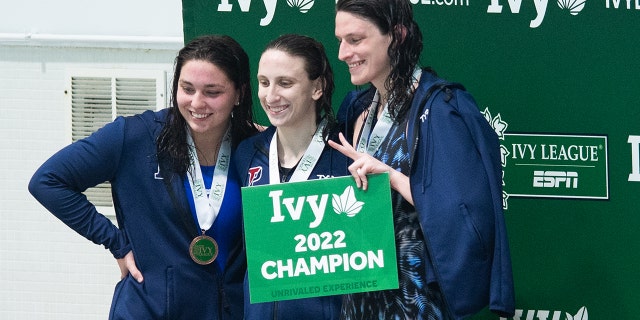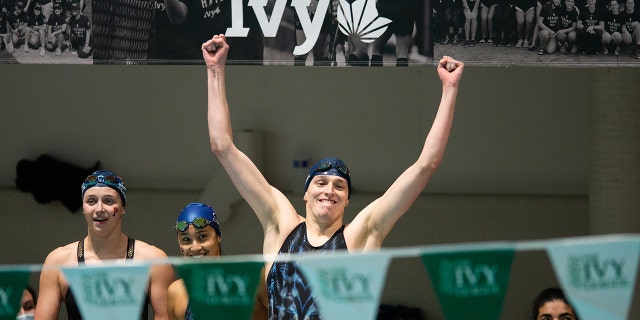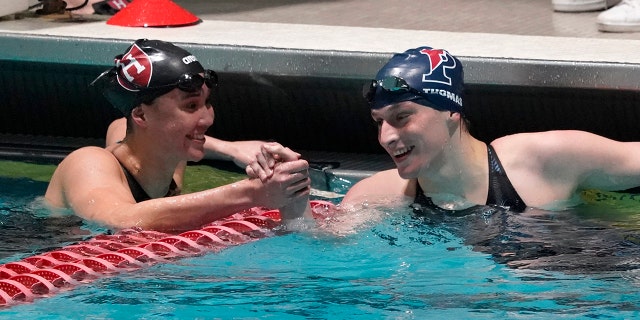Penn's Lia Thomas may have dominated Ivy Championships but tougher competition awaits at NCAAs
Female athletes speak out after Lia Thomas dominates another swim race: ‘The end of female sports’
Track star Cynthia Monteleone and high school track athlete Margaret Monteleone discuss fairness in women’s sports.
Penn’s transgender swimmer Lia Thomas brought the national spotlight to the Ivy League Championships over the weekend and left as a champion in three different races.
Thomas won the 100, 200 and 500 freestyle events during the course of the week as she gets ready for the NCAA Championships in March. Thomas swam a 47.63 in the 100, 1:43.12 in the 200, and 4:37.32 in the 500. While Thomas finished with the quickest times in the Ivy Championships, the transgender swimmer wasn’t the fastest in the nation.
University of Pennsylvania swimmer Lia Thomas smiles on the podium after winning the 500 freestyle during the 2022 Ivy League Womens Swimming and Diving Championships at Blodgett Pool on February 17, 2022, in Cambridge, Massachusetts.
(Kathryn Riley/Getty Images)
University of Pennsylvania swimmer Lia Thomas reacts after her team wins the 400 yard freestyle relay during the 2022 Ivy League Womens Swimming and Diving Championships at Blodgett Pool on February 19, 2022, in Cambridge, Massachusetts.
(Kathryn Riley/Getty Images)
But the competition Thomas goes into next will be against some of the top swimmers in the nation.
With the potential for greatness in Atlanta next month comes the debate that has shadowed the swimmer’s 2021-22 season – whether transgender female athletes should compete against biological females.
Thomas had some support at Blodgett Pool last week. An “8 Against Hate” sign was displayed above the pool between flags representing each of the Ivy League member schools, and several athletes were seen wearing shirts with the same slogan.
Last month, the debate finally reached the NCAA’s doorstep. The governing body for college athletics announced its updated transgender participation policy, saying eligibility would be determined on a sport-by-sport basis. If there is no national governing body for the sport, then the NCAA sport will follow the International Olympic Committee’s (IOC) policy. The NCAA said its policy would become effective in March, starting with the Division I Women’s Swimming and Diving Championships, March 16-19.
On Feb. 1, USA Swimming updated its policy requiring transgender athletes who are competing at an elite level to have small levels of testosterone – half of what Thomas was allowed to compete with – for at least 36 months before being eligible. Thomas’ future in the pool was immediately uncertain.
Pennsylvania’s Lia Thomas, right, is congratulated by Harvard’s Samantha Shelton after Thomas set a meet and pool record in the 200-yard freestyle final at Ivy League women’s swimming and diving championships Friday, Feb. 18, 2022, in Cambridge, Mass.
(AP Photo/Mary Schwalm)
However, the NCAA said last week the Administrative Subcommittee of the Committee on Competitive Safeguards and Medical Aspects of Sports (CMAS) decided that it wouldn’t alter its testosterone guidance after all, stating that “implementing additional changes at this time could have unfair and potentially detrimental impacts on schools and student-athletes intending to compete in 2022 NCAA women’s swimming championships.”
The decision cleared the way for Thomas to compete in the NCAA Championships.
Source: Read Full Article



